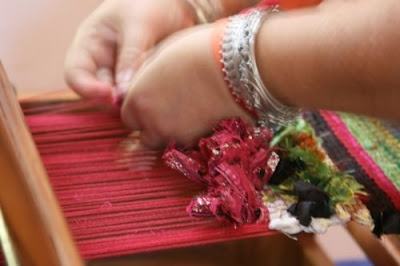Touch of the Brajabasi: Epilogue
serendipity, n. An unsought, unintended, or unexpected occurrence, made by chance and good fortune
The Yamuna River is an enigma to me. She is considered so holy, yet she is so polluted. It was a paradox I never came to peace with while I lived in Vrindavan – I never took achman (a reverent sip), definitely never took bath… and I never even offered my obeisance.
Until my last day in Vrindavan.
If I had had it my way, I would have fulfilled my important mission down by the Yamuna River in the bright afternoon, protected by the safety of the sun.
But I didn’t have it my way. One by one, twists of fate fell like dominos, until at last I found myself walking down Seva Kunja Gully in the twilight, heading for the River, determined to complete my mission. But I was nervous. Very nervous. A woman alone in the dark in India is a dangerous idea.
I began to realize that I would be a fool to go to the river without a man to escort me. I would have to cancel my mission.
And then, serendipity played her card.
Through the mazelike, dusky streets, I saw a man in a yellow shirt. As he drew closer, I squinted and called out, “Bhakti?”
Bhakti Rasa, a gurukuli and a good friend who lives in Vrindavan, called back, “Oh hey, haribol Bhakti, what’s up?”
I gasped, “You’re a man.”
He grinned. “I noticed that.”
“I can’t believe this. Bhakti, please tell me you’re not on some urgent mission,”
“I’m not,”
“Would you accompany me to the Yamuna River? I leave tomorrow at 4am and must do something there tonight.”
He thought for a moment and then said, “Sure, I can come with you,”
I sighed. “Sometimes it’s so tough to be a woman in India. Thanks, Bhakti,”
In the deep blue evening, we made our way to Keshi Ghat. We maneuvered the maze of ancient stairwells and balconies and at last descended the wide stone steps which led right down to the river. The Yamuna was whisper-still.
So. My mission.
I brought out three sets of japa malas (meditation beads) from my sack and set them upon the stone steps. It is Vaishnava tradition to immerse prayer beads in holy water, and I had been searching for the perfect beads for my mother, my father, and for a friend. For a month and a half I had searched, but to no avail.
But only hours before, on my last day in Vrindavan, on my last jaunt to Loi Bazaar, and down a street I didn't usually pass through, I found the perfect beads. The shopkeeper had had only three sets left. Three. I took it as a sign, as serendipity. I took it as a sign to come to peace with the Yamuna River and with Vrindavan.
And so, with a reverence I had never felt before, I slipped off my shoes and knelt before the softly flowing river to immerse each set of smooth sandalwood beads. I prayed for my mother. I prayed for my father. I prayed for my friend. And then, lastly, I immersed my own set of beads. The cool water flowed over and through my hands.
I wound my beads back in their bag and then settled back on to the stone steps. I sang the maha mantra and allowed visions of Vrindavan sweep over me. Gratitude for Srila Prabhupada fell over me in waves - I could never have appreciated Vrindavan without his vision. Radhanath Swami was my guide, and the Brajabasis were my teachers.
And with gratitude comes respect. I will never forget the sensation of cold stone on my toes, forearms and fingers as I knelt upon the steps of Keshi Ghat. The cold seeped through my sari to my knees and the cold, gritty stone pressed upon my forehead as I offered my first respects to Yamuna Devi.
I do not profess that I loved Vrindavan, only that I had learned some respect for the holy dham and those who lived there. And that is all that I had wanted. Respect is the foundation for love, after all.
I rose from my obeisance. Now, only a faint blue glow glimmered on the horizon. The sky was painted with stars. The river murmured. My quiet and fateful companion, Bhakti Rasa, watched all.
“You know, Bhakti Rasa… I have just prayed for something I have not prayed for in my entire time in Vrindavan.”
“What is that?”
“I prayed to return.”






